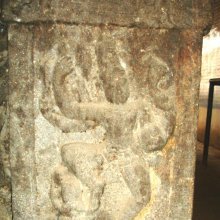Vivartana: 11 definitions
Introduction:
Vivartana means something in Hinduism, Sanskrit. If you want to know the exact meaning, history, etymology or English translation of this term then check out the descriptions on this page. Add your comment or reference to a book if you want to contribute to this summary article.
Images (photo gallery)
In Hinduism
Natyashastra (theatrics and dramaturgy)
Source: Wisdom Library: Nāṭya-śāstra1) Vivartana (विवर्तन, “turning sideways”) refers to a specific gesture (āṅgika) made with the eyeballs (tārā), according to the Nāṭyaśāstra chapter 8. These gestures form a part of the histrionic representation (abhinaya).
2) Vivartana (विवर्तन, “narrowing”) also refers to a specific gesture (āṅgika) made with the lips (uṣṭha), according to the Nāṭyaśāstra chapter 8. These gestures form a part of the histrionic representation (abhinaya).
3) Vivartana (विवर्तन, “turning round”) also refers to a specific gesture (āṅgika) made with the thighs (ūru), according to the Nāṭyaśāstra chapter 10. These gestures form a part of the histrionic representation (abhinaya).
Source: archive.org: Natya Shastra1) Vivartana (विवर्तन, “turning”).—A type of gesture (āṅgika) made with the eyeballs (tārā);—Instructions: turning the eyeballs sideways in a sidelong glance. Uses: in the in the Erotic (śṛṅgāra) sentiment (rasa).
2) Vivartana (विवर्तन, “narrowing”).—A type of gesture (āṅgika) made with the lips (uṣṭha);—Instructions: lips narrowed down. Uses: in envy, pain, contempt, laziness and the like.
3) Vivartana (विवर्तन, “turning round”).—A type of gesture (āṅgika) made with the thighs (ūru);—Instructions: drawing the knee inwards and moving it. Uses: in going round due to causes like hurry.

Natyashastra (नाट्यशास्त्र, nāṭyaśāstra) refers to both the ancient Indian tradition (shastra) of performing arts, (natya—theatrics, drama, dance, music), as well as the name of a Sanskrit work dealing with these subjects. It also teaches the rules for composing Dramatic plays (nataka), construction and performance of Theater, and Poetic works (kavya).
Vyakarana (Sanskrit grammar)
Source: Wikisource: A dictionary of Sanskrit grammarVivartana (विवर्तन).—Transformation; the word is generally used in the sense of transformation of the Padapāṭha into the Saṃhitāpāṭha.

Vyakarana (व्याकरण, vyākaraṇa) refers to Sanskrit grammar and represents one of the six additional sciences (vedanga) to be studied along with the Vedas. Vyakarana concerns itself with the rules of Sanskrit grammar and linguistic analysis in order to establish the correct context of words and sentences.
Languages of India and abroad
Sanskrit dictionary
Source: DDSA: The practical Sanskrit-English dictionaryVivartana (विवर्तन).—1 Revolving, revolution, whirling round.
2) Rolling about, turning round; शय्याप्रान्तविवर्तनै- र्विगमयत्युन्निद्र एव क्षपाः (śayyāprāntavivartanai- rvigamayatyunnidra eva kṣapāḥ) Ś.6.5; Ve.2.8;5.4; Mv.7.5.
3) Rolling back, returning; लाङ्गूलचालनं क्ष्वेडा प्रतिवाचो विवर्तनम् (lāṅgūlacālanaṃ kṣveḍā prativāco vivartanam) Mahābhārata (Bombay) 5.72.71; वप्रान्तस्खलितविवर्तनं पयोभिः (vaprāntaskhalitavivartanaṃ payobhiḥ) Kirātārjunīya 7.11.
4) Rolling down, descending.
5) Existing, abiding.
6) Reverential salutation.
7) Passing through various states or existences.
8) An altered condition; पुनरकाण्ड- विवर्तनदारुणो प्रविशिनष्टि विधिर्मनसो रुजम् (punarakāṇḍa- vivartanadāruṇo praviśinaṣṭi vidhirmanaso rujam) Uttararāmacarita 4.15; Mālatīmādhava (Bombay) 4.7.
9) Moving or wandering to and fro; तामिस्रादिषु चोग्रेषु नरकेषु विवर्तनम् (tāmisrādiṣu cogreṣu narakeṣu vivartanam) Manusmṛti 12.75.
1) Transformation.
11) Circumambulating (pradakṣiṇā)
Derivable forms: vivartanam (विवर्तनम्).
Source: Cologne Digital Sanskrit Dictionaries: Edgerton Buddhist Hybrid Sanskrit DictionaryVivartana (विवर्तन).—nt., chapter, or treatise: (asti Mañjuśrīḥ tvadīya-) kalpa-visare (in the abundance of thy books of rules ?) śabdagaṇanānirdeśaṃ nāma vivartanaṃ (Ārya-)Mañjuśrīmūlakalpa 253.4; in line 10 it is called a dharmaparyāya.
Source: Cologne Digital Sanskrit Dictionaries: Benfey Sanskrit-English DictionaryVivartana (विवर्तन).—i. e. vi-vṛt + ana, n. 1. Going round, revolving. 2. Reverential salutation, [Kirātārjunīya] 5, 40. 3. Turning round, overturning, [Uttara Rāmacarita, 2. ed. Calc., 1862.] 102, 4. 4. Tossing to and fro, [Śākuntala, (ed. Böhtlingk.)] [distich] 132. 5. Returning, [Kirātārjunīya] 7, 11. 6. Passing in succession, [Mālatīmādhava, (ed. Calc.)] 23, 14; as various hells, [Mānavadharmaśāstra] 12, 75. 7. Being, abiding. 8. Causing to change, [Mālatīmādhava, (ed. Calc.)] 71, 8.
Source: Cologne Digital Sanskrit Dictionaries: Cappeller Sanskrit-English DictionaryVivartana (विवर्तन).—[adjective] turning, revolving, changing; [neuter] the action of turning etc., moving hither and thither, wandering, roaming, turning away or back; turning point, change.
Source: Cologne Digital Sanskrit Dictionaries: Monier-Williams Sanskrit-English Dictionary1) Vivartana (विवर्तन):—[=vi-vartana] [from vi-varta > vi-vṛt] mfn. turning round, revolving, [Mahābhārata]
2) [v.s. ...] changing, transforming, [Kathāsaritsāgara]
3) [v.s. ...] n. (ifc. f(ā). ) rolling (of a horse), [Ṛg-veda i, 162, 14]
4) [v.s. ...] n. rolling or tossing about, struggling, [Kāvya literature; Kathāsaritsāgara] (also f(ā). , [Haravijaya])
5) [v.s. ...] n. moving or wandering to and fro, [Manu-smṛti xii, 75]
6) [v.s. ...] turning round, [Suśruta]
7) [v.s. ...] turning, turn, change, [Taittirīya-brāhmaṇa; Mālatīmādhava]
8) [v.s. ...] turning away or back, [Mahābhārata; Kālidāsa]
9) [v.s. ...] returning, return, [Kirātārjunīya]
10) [v.s. ...] n. a kind of dance (also -nṛtya n.), [Saṃgīta-sārasaṃgraha]
11) [v.s. ...] n. transformation, [Ṛgveda-prātiśākhya]
12) [v.s. ...] existing, being, abiding, [Horace H. Wilson]
13) [v.s. ...] going round, circumambulating (an altar etc.), [ib.]
14) [v.s. ...] reverential salutation, [Monier-Williams’ Sanskrit-English Dictionary]
15) [v.s. ...] causing to turn or to change, overturning, [ib.]
Source: DDSA: Paia-sadda-mahannavo; a comprehensive Prakrit Hindi dictionary (S)Vivartana (विवर्तन) in the Sanskrit language is related to the Prakrit word: Viuṭṭaṇa.
[Sanskrit to German]
Sanskrit, also spelled संस्कृतम् (saṃskṛtam), is an ancient language of India commonly seen as the grandmother of the Indo-European language family (even English!). Closely allied with Prakrit and Pali, Sanskrit is more exhaustive in both grammar and terms and has the most extensive collection of literature in the world, greatly surpassing its sister-languages Greek and Latin.
Kannada-English dictionary
Source: Alar: Kannada-English corpusVivartana (ವಿವರ್ತನ):—[noun] = ವಿವರ್ತ [vivarta] 1 & 3.
Kannada is a Dravidian language (as opposed to the Indo-European language family) mainly spoken in the southwestern region of India.
See also (Relevant definitions)
Starts with: Vivartananritya.
Ends with: Vavivartana.
Full-text: Viuttana, Vivartananritya, Uru, Ushtha, Vivarta, Tara, Naraka.
Relevant text
Search found 6 books and stories containing Vivartana, Vi-vartana; (plurals include: Vivartanas, vartanas). You can also click to the full overview containing English textual excerpts. Below are direct links for the most relevant articles:
Chaitanya Bhagavata (by Bhumipati Dāsa)
Verse 2.6.13 < [Chapter 6 - The Lord’s Meeting with Advaita Ācārya]
Verse 2.6.32 < [Chapter 6 - The Lord’s Meeting with Advaita Ācārya]
Manusmriti with the Commentary of Medhatithi (by Ganganatha Jha)
Verse 12.75 < [Section IX - Details of Transmigration]
Rig Veda (translation and commentary) (by H. H. Wilson)
Rig Veda 1.162.14 < [Sukta 162]
Natyashastra (English) (by Bharata-muni)
Chapter X - Gestures of other Limbs
Chapter VIII - Gestures of Minor Limbs (upāṅga)
Gati in Theory and Practice (by Dr. Sujatha Mohan)
Gati pertaining to conditions and situations < [Chapter 3 - Application of gati in Dṛśya-kāvyas]
Maha Prajnaparamita Sastra (by Gelongma Karma Migme Chödrön)
Act 1.6: Definition of trisāhasramahāsāhasralokadhātu < [Chapter XIV - Emission of rays]
Bhūmi 7: the far-gone ground (dūraṃgamā / dūraṅgamā) < [Chapter XX - (2nd series): Setting out on the Mahāyāna]

